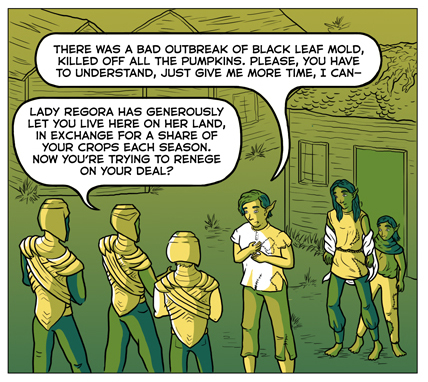Five Thoughts About Page 238
Page 238 is available in the world, so now’s a good time to share some thoughts about it.
1. I’m really pleased with the narrative efficiency of this story–that is to say, a lot of stuff is happening quickly, but hopefully it doesn’t feel rushed. We’re two pages in, and we already have a strong sense of Brianna’s childhood, her family life, her hopes and dreams, the socioeconomic realities of her society, and the traumatic even that changes her life forever. Not bad!
2. My instinct is to make this story so, so dark. Brianna’s childhood is bad; that’s key to the trajectory her life takes. When I get too dark, though, Abi reigns me in. When we talked this over, there were several times I said, “And what if, then, [something terrible] happens?” and Abi would reply with, “No! That’s terrible!” It’s a good thing she’s there to remind me that this is an all-ages comic. I’m happy with our compromises–it’s still pretty terrible that Brianna’s mother is willing to hand over her daughter, right?
3. When I say “dark,” I don’t mean like R-rated violence or anything. What we’re going for here is a fairy tale sort of tone. Brianna’s mother, in this story, is still not as bad as Hansel and Gretel’s mother, who convinces dad to send the kids out into the woods so that they’ll starve. And Cinderella’s no stranger to a life of terrible servitude.
4. Abi was horrified when I told her that the practices on this page, sharecropping and indentured servitude, are both real and have both happened here in America. It’s important to acknowledge these things.
5. We’re trying some new creative strategies for this story. Abi and I sat down and discussed the opening part in detail and, like I mentioned earlier, argued until we reached a compromise we were both happy with. In the past I’ve tended to approach the pages visually, so the next step has been to break the story down into pages and panels. The problem is, this means making the words fit the panels instead of vice versa, and it means that Sam has limited freedom to plan the page.
This time, with Abi’s assistance, I typed up Brianna’s narration and the dialogue, without worrying about how it fit into panels. And, what do you know, approaching it this way made the narrative flow better. I then resisted the urge to plan the page layout and sent Sam the script, with very little detail. This gave her much more freedom, and the page benefited from it–she designed the characters, the setting, and the panel breakdown with very little input from me. I’m really happy with how this approach is working, because it makes the process more collaborative, with Abi, Sam, and me all shaping the story.
